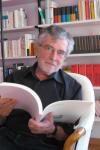Rainer Nägele
Alfred C & Martha F Mohr Professor of Germanic Languages & Literatures, Professor of Comparative Literature
 Rainer Nägele, the University of Innsbruck, Austria and University of Göttingen, West Germany, Ph.D. University of California, Santa Barbara, faculty member at Yale since 2006: Your many brilliant and innovative books along with your numerous essays and your remarkable intellectual performances in the classroom have taught us, ever anew, how to think and how to write. Your texts transform our sense of such seminal authors as Hölderlin, Brecht, Benjamin, Celan, Goethe, Artaud, Freud, Böll, Handke, Keller, Nietzsche, Müller, Trakl, Kafka, Martin Walser, Lacan, Szondi, Rilke, Rimbaud, Kommerell, and Baudelaire and ask us to rethink the tradition of ancient Greece. They have transformed as well such cherished concepts as translation and presentation (Darstellung). They are often political acts of great wisdom and courage.
Rainer Nägele, the University of Innsbruck, Austria and University of Göttingen, West Germany, Ph.D. University of California, Santa Barbara, faculty member at Yale since 2006: Your many brilliant and innovative books along with your numerous essays and your remarkable intellectual performances in the classroom have taught us, ever anew, how to think and how to write. Your texts transform our sense of such seminal authors as Hölderlin, Brecht, Benjamin, Celan, Goethe, Artaud, Freud, Böll, Handke, Keller, Nietzsche, Müller, Trakl, Kafka, Martin Walser, Lacan, Szondi, Rilke, Rimbaud, Kommerell, and Baudelaire and ask us to rethink the tradition of ancient Greece. They have transformed as well such cherished concepts as translation and presentation (Darstellung). They are often political acts of great wisdom and courage.
A much sought after visitor you have been welcomed throughout the Western world as lecturer and as visiting professor. Generations of devoted students have learned from you and populate departments of literature from coast to coast and beyond, bringing your remarkable, revolutionary modes of meditation and writing to younger generations.
Your exquisite autobiographical work (you speak, more precisely, of topobiographien) tells of a childhood spent in Liechtenstein as a “factory kid”. The dialect term Pfabregg renders the German Fabrik. One cannot help thinking that as you wandered away from this early world you yourself took up a radical form of fabrication, the weaving of ever stunning, experimental texts that persistently lay no claim to conventional concepts of truth. As a child you ate three meals a day of the same kind of porridge. As an adult you became a magnificent chef with great generosity of spirit, celebrating that art with both your students and colleagues. We are nourished by all that you do.
We know that your immediate plan in your retirement years is to read all of Goethe, systematically, from beginning to end. How fortunate for Goethe! He will never find a better reader.
Tribute Editor: Penelope Laurans